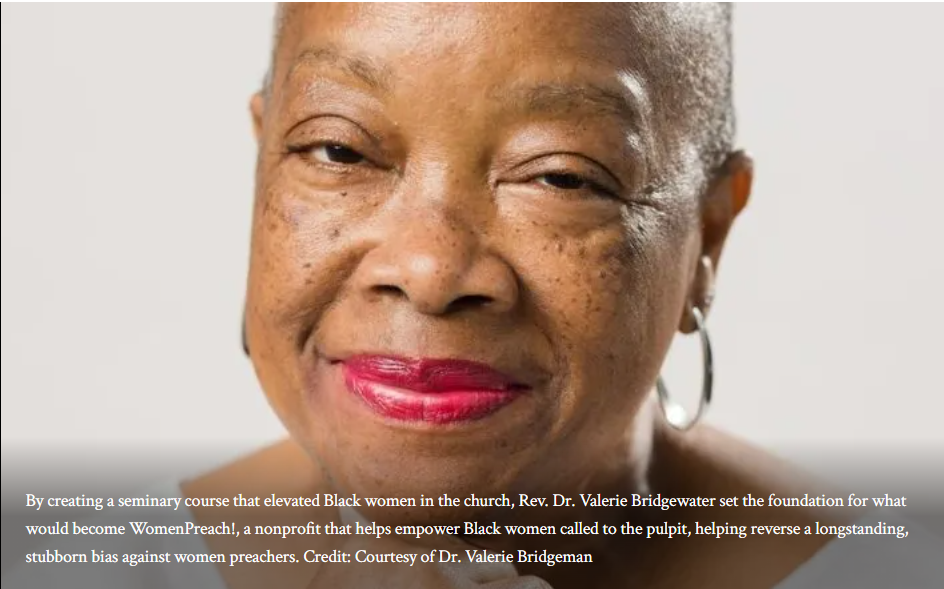Throughout the history of the Black church, men have dominated the pulpit, hampering efforts by women to break through and share a female-centered interpretation of the Bible. WomenPreach! has an academy named after Jarena K. Lee, the first Black woman evangelist in the African Methodist Episcopal Church.
It’s been a stubborn reality for women in the Black church: men who are called to preach are readily accepted, but women struggle to have their call even acknowledged, much less get encouragement to preach their interpretation of the Gospel.
So in 2006, Rev. Dr. Valerie Bridgeman, then a teacher at Memphis Theological Seminary, created a course to elevate women in the Black church. It was such a hit that she took the course — “The Sacred Voices of Black Women” — condensed it to one week and took it to the Cathedral College of Preachers in Washington, D.C.
LEARN MORE: Dr. Shavon Arline-Bradley Talks Faith and the Power of Black Women
The course gave women seminarians historical and literary references to use in sermons while arming them with strategies to handle sexism in the church. It was so popular that attendees told Bridgeman it should be permanent — even if Bridgeman herself wasn’t quite sure what it was, or if she wanted to do it.
“We didn’t even have a ministry or a name for a ministry or anything,” Bridgeman says. “I had just done some work at the National Cathedral on preaching, and at that time, several of the women who were involved in that said, ‘We need this and we need you to do it.’ And I was like, ‘No, not gonna.’”
Her fans persisted, and Bridgeman finally gave in. With a small grant in hand, “we imagined that we would do this one event with this $10,000 and call it done,” she says. “And 15 years later, here we are.”
All [the men] were like, ‘Oh my God, I’m changed. I will never look at that text like that again. I will never call women that word again. I’ll never use those kinds of examples again.’
Rev. Dr. Valerie Bridgeman, on men who attend Womenpreach!’s Sophie’s table
Her organization, WomenPreach!, is a nonprofit that helps support Black women of the cloth. It is now celebrating 15 years of facilitating and instructing the art of preaching.
Her Poetry Preaches
While WomenPreach! focuses on helping women succeed in ministry and church leadership, the organization goes beyond traditional ministry. The current cohort includes a poet, Jaha Zainabu.
“We have an artist in residence, a laywoman who represents that outside voice preachers often ignore,” says Bridgeman, who now teaches at Methodist Theological School in Ohio. “And her poetry is raw and it’s intimate and it’s non-churchy. And it’s designed to make preachers break out of their ‘preacherly’ thinking and remember who’s sitting in the pew, who’s out in the streets.”
“What’s interesting about [her] is she was only going to be our artist-in-residence for the first two years, and then we were going to rotate and get a new one,” Bridgeman says. “But she endeared herself to the program because she understood the assignment and lived it out.”
Jarena K. Lee Preaching Academy
One of the cornerstones of WomenPreach! is the Jarena K. Lee Preaching Academy. Named for the nation’s first Black woman preacher, who was also the first woman evangelist in the African Methodist Episcopal Church, the academy is held every other year, and cohorts are intentionally kept small, to around 25 women.
“It’s the only one of our events that is competitive,” Bridgeman says. “It’s the only thing you have to apply for.” The results, however, can be profound.
Bridgeman tells the story of a recent JKLPA attendee who couldn’t say enough about her experience. At the conference, she was sought out by a woman she hadn’t met, but insisted on taking her to lunch.
“And she said to me, ‘I came because I felt pulled to come. I didn’t even want to come. I never preached at all, but I was leading Bible studies and whatever. And she said she was getting ordained that week.”
“She said the preaching academy she’d previously attended had allowed her to accept her call.
Sophie’s Table
RELATED: Black Women, Harnessing the Power of Prayer
While its agenda is spelled out in its title, WomenPreach! does speak to men through Sophie’s Table, a branch established to help men see preaching from a womanist, Black feminist point of view. While it’s been somewhat of a challenge to attract attendees, Bridgeman says, those who have attended have had their perspectives altered.
“All of them were like, ‘Oh my God, I’m changed. I will never look at that text like that again. I will never call women that word again. I’ll never use those kinds of examples again,’” Bridgeman says. “And then when I have seen some of those men later, seen their sermons later, they did change.”
Last word
Reaching 15 years is a remarkable milestone for many reasons, among them the number of women who proudly proclaim the gospel with great joy.
“We are not a brick and mortar. We are a movable feast,” Bridgeman says. “We do nothing without collaboration. That’s our highest ethic. No matter what we’re doing, we collaborate with someone else because it’s part of what we are trying to model — I don’t know that we pull it off — is that we can do this work together.”
Though it’s been challenging, “I wouldn’t take anything for the journey,” she says. “It’s been amazing to watch God work, even when we didn’t have what we thought we needed.


